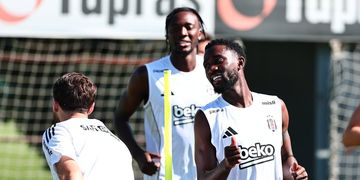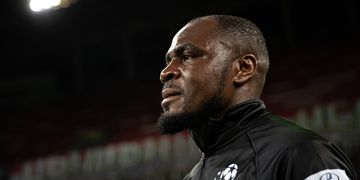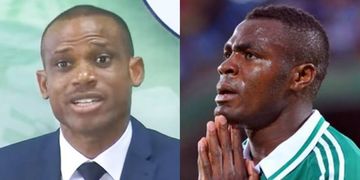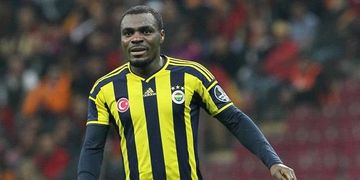Emmanuel Emenike was the best striker in Africa in the year 2013 AD. He scored four goals as Nigeria became champions for the third time at the Africa Cup of Nations in South Africa. Even though he missed the final game in Johannesburg due to an injury, Emenike had done enough to share the golden boot.
He was in a jovial mood by the pitchside during training the evening before the final game. I asked him if he was going to play, but he was evasive.
The entire country had hoped for better news about their newfound talisman for the championship as the Eagles prepared to meet Burkina Faso for a second time. There was palpable fear that Emenike's absence could work against Nigeria's chances of winning the final.
On that Sunday evening, in front of 85,000 fans inside Soweto's Soccer City, it was Sunday Mba that shouldered the burden and scored the winner for Nigeria. It was Mba who became the name on the lips of every African.
Perhaps it was the reason that Emenike flew under the radar when the Eagles arrived in Addis Ababa later that October for the first leg in their final qualifying round for the 2014 FIFA World Cup Brazil.
At the Bole International Airport that Saturday morning, it was John Obi Mikel, who was at the time playing for Chelsea that was the cynosure of eyes. The Ethiopian fans called out his name as the Eagles walked into their team bus. Mikel waved back, a quiet, regal gesticulation.

Built in the 1940s, the Addis Ababa Stadium is a 25,000 capacity edifice that had seen better days. It had a very small media tribune without a place for media working with computers. It was not built for modern football.
For a country that had produced many Olympic champion runners, Ethiopia had until that time failed to invest in sports facilities. The greatest sportspeople out of that enormous country had been marathoners.
But that year, football had gained a resurgence. The Walyas had qualified for their first Africa Cup of Nations in 31 years and were a game away from reaching the knockout stages when they met Nigeria.
Fans travelled by road to South Africa to witness their return to the big stage. After Victor Moses scored two penalty kicks in that match in Rustenberg to knock them out, I saw several Ethiopian fans pass the night on that city's street before they returned home. The country's passion for the game was undeniable.
On Saturday, fans had begun arriving in Addis and waited for tickets to go on sale. During the Super Eagles training, many fans waited outside to catch a glimpse of them.
As the Eagles trained with Stephen Keshi in charge, they received a visit from no less than the Nigerian President. Dr Goodluck Jonathan was in town to attend the African Union Heads of State meeting. He encouraged the team and challenged them to win the game for their compatriots back home. It was a big morale boost.
I had arrived in Addis Ababa on Friday, two days before the game. My reservation was at the Intercontinental Hotel, a significant residence for visitors to the city.
I felt fortunate when I checked in and discovered that the Walyas were staying there. As I grabbed my luggage to enter the elevator, I saw Sewnet Bishaw, the soft-spoken coach of the Ethiopians, and his war council seated at the lobby.
My first instinct was to introduce myself to the man. I had attended two press conferences with him in South Africa earlier in the year and was glad to see him again.
He agreed to have an interview the next day at a more convenient time. I had unwittingly set off a series of events that would get me into trouble.
At breakfast on Saturday, I saw a few of the Walyas players and made contact with Saladin Said, their top scorer. His reputation was immense. He had led the Walyas to top their second-round qualifying group ahead of South Africa.
His English was not good, but he promised to speak to me later. I had planned to get an interpreter. Soon after I returned to my room, I received a phone call from a receptionist that the coaches of the Ethiopian National Team had complained about having a Nigerian journalist in the same hotel.
After the back and forth, I asked to speak with the manager who recruited a Nigerian that worked as a local radio DJ to plead with me to take another hotel. At this meeting, I was told something different. The manager said that they needed rooms for African Union officials.
I was going to reject their offer, but the Nigerian DJ begged me not to refuse as it could mean dealing with the apparatus of a police state. I left the hotel and moved to a smaller hotel on the other side of town. It was newer and cleaner.

On game day, the entire city buzzed. Fans had come from faraway towns just to witness the Walyas' dreams of a World Cup ticket. The queues to purchase tickets wound all around the stadium and into the adjoining Meskel Square and the new train station that was under construction.
My taxi was stopped about a mile from the stadium, so I walked. Inside the arena, I had never witnessed that type of chaos (until the Ahmadu Bello Stadium in Kaduna three years later).
There were practically no seats left, yet the people on the ticket lines were much more than those inside. Fans had overrun the media tribune.
Many of the Nigerian media corps in attendance had decided to sit by the pitch side, just behind the Super Eagles. My match day task was to run a live text blog for the company website. It meant I could not work from inside the stadium. I contacted my managing editor, who said it was better to go back to the hotel so as not to miss the game.
It was a tough decision, but the job came first. I was inside the hotel room and watching on TV when Behailu Assefa scored a freak goal in the 55th minute. Assefa's run down the left and a cross into the box was misjudged by Vincent Enyeama, one of the best goalkeepers in Africa.
Enyeama grabbed the ball with both feet behind the goal-line and threw it back into play. But referee Neant Alioum of Cameroon had seen the assistant referee's flag go up, and he wasted no time by pointing to the centre circle.
The Eagles were stunned. The African champions had to find a response. They had to face their opponents and a boisterous crowd that suddenly saw the possibility of a victory. My hotel room shook to its foundation as the referee awarded that goal.
There was celebration across the reception and the poolside restaurant where residents erupted in jubilation. The noise reverberated across many homes, on the streets of Addis Ababa and all over the country. There was a massive belief that it could be their day.
That was when Emenike grabbed the game by the jugular and restored the Eagles' pride. The fightback started immediately, but it wasn't until the 67th minute that the breakthrough came.
Emenike received an otherwise safe pass from substitute Nosa Igiebor. He ran down the middle and shot from around the 25-yard mark, a bullet of a shot that rattled the post behind Jemal Tassew. And at that moment, you could hear a baby's cry across the entire Addis metropolis. It was like the uneasy quiet before dawn.
The game was not without controversy. Saladin had a shot that seemed to cross the line but was saved by Godfrey Oboabona's lunging challenge to keep it out.
TV replays showed that it should have been a goal. Any other player would have let the goal-bound effort slide. Still, Oboabona dove in and made sure the officials gave him the benefit of the doubt despite the Ethiopians' protestations.
As the game neared its eventful end, Emenike continued to torment the Walyas. On the 88th minute, he received an inch-perfect pass into the box from Obi Mikel, and as he was about to unleash another shot was pulled down by Aynahem Hailu.
He won a late penalty in front of the home fans who swore and prayed that he would miss. Nigeria's number nine had a personality made for big games.
He scored from a freekick against the Elephants of Cote d'Ivoire in the Africa Cup of Nations quarter-final in Rustenberg in February. His big, broad shoulders were made for weighty moments like this one.
Emenike stepped up to the spot. He placed the ball down gently and faced Tassew, one-on-one. The game of penalties is a tricky one. It is about who makes the first move. Who can keep their nerves when the referee blows his whistle.
Addis Ababa held its breath. And so it was that Tassew moved first. As he took a step to his right in anticipation, Emenike hit the ball calmly to the left, low and into the net.
The city of Addis Ababa crumbled under the weight of its expectations. Emenike had cast a dagger through its heart and crushed the dreams of a 100 million Ethiopians.
Back in my hotel room, I filed my final words on the website a few moments later. When I walked out into the reception, everywhere was quiet. Addis Ababa had fallen silent.
Nigeria won the second leg in Calabar 2-0 a month later and qualified for the World Cup. But it was that game in Addis Ababa that I will always remember.
It was the last of Emenike's nine international goals for Nigeria, eight of them scored in the year 2013. He retired from international football two years later due to insults. I dare say, it was his best performance in a Nigeria jersey. The scalp of Addis Ababa would always be his crown jewel.






A beautiful peace from a great writer. I remember that they vividly. I was with the Nigeria Football Supporters Club headed by the evergreen Dr. Rafiu Ladipo. The Federal Government of Nigeria had approved the release of a private plane that ferried over 200 supporters free of charge to Addis Abba. I remember the swarm of Ethiopian heads in their National team jerseys. It was one of my best moment.
This story made it all seems like yesterday. Thank you for this great reminder of a glorious moment in time.
Thank you. We must have walked past each other on that Saturday when the Eagles landed in Addis Ababa because I was present and made photos of the arrival.